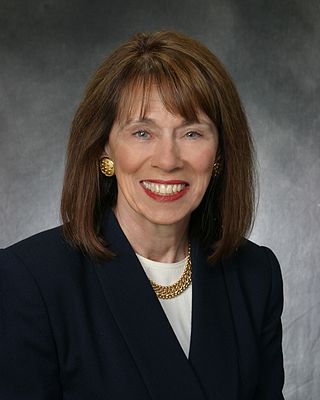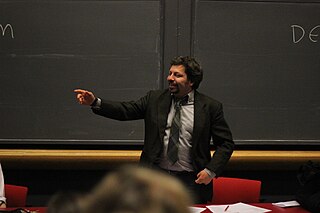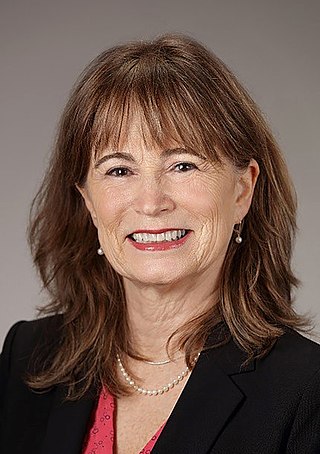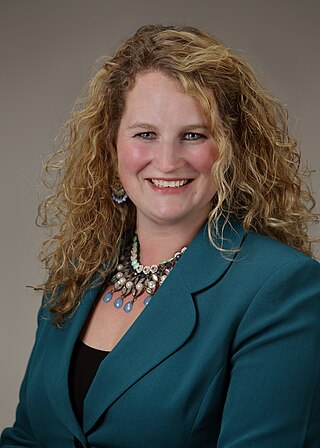Bioethics is both a field of study and professional practice, interested in ethical issues related to health, including those emerging from advances in biology, medicine, and technologies. It proposes the discussion about moral discernment in society and it is often related to medical policy and practice, but also to broader questions as environment, well-being and public health. Bioethics is concerned with the ethical questions that arise in the relationships among life sciences, biotechnology, medicine, politics, law, theology and philosophy. It includes the study of values relating to primary care, other branches of medicine, ethical education in science, animal, and environmental ethics, and public health.

Baylor College of Medicine (BCM) is a medical school and research center in Houston, Texas, within the Texas Medical Center, the world's largest medical center. BCM is composed of four academic components: the School of Medicine, the Graduate School of Biomedical Sciences; the School of Health Professions, and the National School of Tropical Medicine.

Arthur L. Caplan is an American ethicist and professor of bioethics at New York University Grossman School of Medicine.

Anthony Stephen Fauci is an American physician-scientist and immunologist who served as the director of the National Institute of Allergy and Infectious Diseases (NIAID) from 1984 to 2022, and the chief medical advisor to the president from 2021 to 2022. Fauci was one of the world's most frequently cited scientists across all scientific journals from 1983 to 2002. In 2008, President George W. Bush awarded him the Presidential Medal of Freedom, the highest civilian award in the United States, for his work on the AIDS relief program PEPFAR.

The National Institute of Nursing Research (NINR), as part of the U.S. National Institutes of Health, supports clinical and basic research to establish a scientific basis for the nursing care of individuals across the life span—from management of patients during illness and recovery, to the reduction of risks for disease and disability, and the promotion of healthy lifestyles.

Edmund Daniel Pellegrino was an American bioethicist and academic who served as the 11th president of The Catholic University of America (CUA) from 1978 to 1982. For 35 years, Pellegrino was a distinguished professor of medicine and medical ethics and the Director of the Kennedy Institute of Ethics at Georgetown University. Pellegrino was an expert both in clinical bioethics, and in the field of medicine and the humanities, specifically, the teaching of humanities in medical school, which he helped pioneer). He was the second layman to hold the position of President of Catholic University.
Albert R. Jonsen was one of the founders of the field of Bioethics. He was Emeritus Professor of Ethics in Medicine at the University of Washington, School of Medicine, where he was Chairman of the Department of Medical History and Ethics from 1987 to 1999. After retiring from UW, he returned to San Francisco, where he co-founded the Program in Medicine and Human Values at Sutter Health's California Pacific Medical Center in 2003.

Georgetown University School of Medicine, a medical school opened in 1851, is one of Georgetown University's five graduate schools, and is the most applied-to medical school in the nation with a matriculation rate of 1.40%. It is located on Reservoir Road in the Georgetown neighborhood of Washington, DC, adjacent to the university's main campus. The School of Medicine works in association with the 609-bed MedStar Georgetown University Hospital, MedStar Washington Hospital Center, and nine other affiliated federal and community hospitals in the Washington metropolitan area. Georgetown is the oldest Catholic medical school in the United States.

Georgetown University Medical Center is a Washington, D.C.-based biomedical research and educational organization affiliated with Georgetown University that is responsible for over 80% of the university's sponsored research funding and is led by Edward B. Healton, MD, the Executive Vice President for Health Sciences and Executive Dean of the School of Medicine.
Jonathan D. Moreno is an American philosopher and historian who specializes in the intersection of bioethics, culture, science, and national security, and has published seminal works on the history, sociology and politics of biology and medicine. He is an elected member of the National Academy of Medicine.
Dan W. Brock was an American philosopher, bioethicist, and professor emeritus at Harvard University and Brown University. He was the Frances Glessner Lee Professor Emeritus of Medical Ethics in the Department of Global Health and Social Medicine at Harvard Medical School, the former Director of the Division of Medical Ethics at the Harvard Medical School, and former Director of the Harvard University Program in Ethics and Health (PEH).
The MacLean Center for Clinical Medical Ethics, founded in 1981, is a non-profit clinical medical ethics research institute based in the United States. Founded by its director, Mark Siegler, the MacLean Center for Clinical Medical Ethics aims to improve patient care and outcomes by promoting research in clinical medical ethics by educating physicians, nurses, and other health care professionals and by helping University of Chicago Medicine patients, families, and health care providers identify and resolve ethical dilemmas. The center has trained over 410 fellows, including many physicians, attorneys, PhDs and bioethicists.

Patricia A. Grady is an American neuroscientist internationally recognized for her research on stroke, which specializes in cerebral blood flow, metabolism, and function. She is director of the National Institute of Nursing Research (NINR), part of the National Institutes of Health (NIH) in Bethesda, Maryland. Grady was elected to the Institute of Medicine in 1999 and is a member of several scientific organizations, including the Society for Neuroscience and the American Academy of Nursing. She is a fellow of the American Stroke Association and the American Neurological Association.

Christine I. Mitchell is an American filmmaker and bioethicist and until her retirement in September 2022, the executive director of the Center for Bioethics at Harvard Medical School (HMS).
Eric M. Meslin PhD FRSC FCAHS is a Canadian-American philosopher-bioethicist and current President and CEO of the Council of Canadian Academies (CCA).

This article is about the Nir Eyal (bioethicist). For the author, see Nir Eyal.

Marion Danis is an American bioethicist and physician-scientist. She is head of the section on ethics and health policy and chief of the bioethics consultation service at the National Institutes of Health Clinical Center.

Annette Rid is a bioethicist and physician-scientist specialized in research ethics, global health ethics, and justice in health and health care. She works at the National Institutes of Health Clinical Center.

Ann King Cashion is an American nurse scientist specialized in genetic markers that predict clinical outcomes. She is a professor emerita in the department of health promotion/disease prevention at the University of Tennessee Health Science Center. Cashion was the acting director of the National Institute of Nursing Research from 2018 to 2019.

Carrie Wolinetz is the Principal and Chair of Lewis-Burke Associate's Health and Bioscience Innovation Policy Practice Group. She formerly served in the National Institutes of Health as Senior Advisor to the Office of the Director, Associate Director for Science Policy, and Chief of Staff to Francis Collins. She also led the inaugural Health and Sciences division in the White House Office of Science and Technology Policy.














